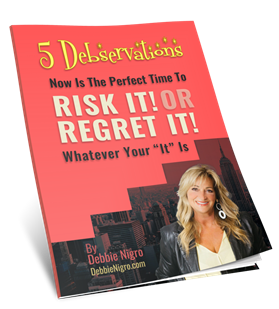Thrift Shops & Online Hustles Are Booming
On this week’s Trending Tuesday on The Debbie Nigro Show, we talked tariffs, thrift shops, and thriving through turbulence.
Whether you’re bargain hunting or business-minded, there’s never been a better time to think secondhand—or second income!
According to the 2024 Thrift Industry Report by Savers Value Village 16-18% of Americans shop at thrift stores each year: 12 to 15% shop at consignment or resale stores.
Nearly 90% of consumers have shopped or donated at a Thrift Store up from 83% in 2022.

It’s The Ultimate Treasure Hunt
Personally, I will donate through one door and then go back in and shop through another door. LOL I love the treasure hunt fun and get excited when I find something unique! It could be anything!
Meanwhile the report went on to say…
*Among the many incredible changes the thrift industry has seen in recent years, one of the most significant is the mainstreaming of this once-niche retail segment.
*Long seen as serving those on a limited budget, secondhand has emerged as a symbol of creativity and individuality and now appeals to a wide range of shoppers who are increasingly seeking value—and style.
*Another notable trend is the growing environmental awareness of consumers who are putting the planet first by choosing secondhand.

I was joined by Parag Amin, a savvy Los Angeles business attorney who helps entrepreneurs avoid costly mistakes (like the one that derailed his father’s American dream).
Parag shared how rising prices from tariffs are pushing more people toward secondhand shopping—and why that shift is also sparking big-time opportunity.
From consignment goldmines to online stores, more people are flipping used goods and making real money. Think resale clothing, Amazon brands, and influencer-fueled product lines. It’s all about low overhead, smart sourcing, and even smarter risk management. And yes, Parag’s seen clients go from leggings to luxury lifestyles—literally!
Pro tip from Parag: Want to test a resale biz? Start with consignment. No upfront cost, no inventory headaches, and way less risk.
Tune in for insights, laughs, and inspiration—
Listen now to this short podcast of my conversation with Parag Amin and get the full scoop on from The Debbie Nigro Show. If you’d rather read than listen the audio of the transcript is below.
AUDIO TRANSCRIPT:
0:00:00
(Speaker 5)
And now, back to the Debbie Nigro Show!
0:00:23
(Speaker 2)
So maybe those sneakers that you’re looking at are sitting there reading the paper and were bought at a thrift shop, secondhand store, consignment shop. Very very likely. Even people who are well to do find this a fun thing to do. Okay. Hi everybody, I’m Debbie Nigro.
0:00:39
(Speaker 2)
But I gotta tell you on Trending Tuesday, maybe people will be shopping at these places, not so much for fun, but because they can’t afford to shop where they used to shop because of all the tariffs that are going on. And I’m going to talk about this because I love thrift shops and love the whole world and when watching the trend just bulge, you know, online, offline, in-store. So Parag Amin is a terrific guy to have a chat with us about.
0:01:03
(Speaker 2)
He’s a revered attorney out in the Los Angeles area. He’s a business attorney and a lot of people love him and love working with him. Hey, Parag, welcome to the show. You’ve been on once before. I’m welcoming you back.
0:01:16
(Speaker 1)
Thank you, Debbie. Hi, good to be back. Thank you for having me.
0:01:19
(Speaker 2)
Yeah, I really love the backstory about why you became a business lawyer. You want to take two seconds on what happened to your father that pushed you in this direction?
0:01:28
(Speaker 4)
Sure.
0:01:29
(Speaker 1)
Yes, Debbie. So my dad was an entrepreneur, had this dream, and he invested the family’s life savings in this store in Florida. And unfortunately, what he didn’t know was that the guy he had bought it from just hadn’t paid his sales taxes. And unfortunately, the taxing authority came knocking and said look you own the store
0:01:47
(Speaker 1)
now you bought the entity which is the company that owned the store and unfortunately you’ve got to pay it look the fact that the other guy didn’t pay it between you and him but you own it now and the company owes us this money so it was over a $200,000 tax liability, and unfortunately my dad just said, look, I just can’t afford that. So he ended up shutting down the store and getting a factory job that he worked
0:02:11
(Speaker 1)
until he just retired a few months ago. So, you know, it just goes to show how important due diligence is and how important it is to have the right people in your corner. And that’s one of the main reasons I ended up becoming an attorney. So that doesn’t happen to other people.
0:02:26
(Speaker 2)
I’m so sorry for you, father. I felt so bad about that story, but out of that came you making sure it doesn’t happen to anybody else going forward. So congratulations to you for taking the responsibility. I’m sure you studied hard to become this kind of attorney. Oh my goodness.
0:02:41
(Speaker 2)
All right. So we’re talking about the opportunity, business opportunity here. With the tariffs, clothing and many things of course are going to go up in price and you’re seeing a trend and I’m seeing it too of more people going to second-hand places to buy things which I love already but people who never did it might just start exploring. People who may want to take advantage of the business opportunity might want to get into serving up these items. So is that what you’re seeing?
0:03:09
(Speaker 1)
That’s right, Debbie. I mean, you know, when it comes to any kind of price increase, we’re gonna see some level of sensitivity and people looking at alternatives. So you’re absolutely right that more people are looking at second-hand purchases so that they’re not as directly affected by tariffs. But look, the reality is also, Debbie, you know this, when people are looking at alternatives,
0:03:32
(Speaker 1)
it’s the laws of supply and demand. So the more people that start getting into it and start looking at it, the prices will start increasing, just like we saw across the board during COVID. We saw used car prices increase. We saw the cost of secondhand watches increase.
0:03:50
(Speaker 1)
We saw items across the board that people were buying, even if they were used, increasing because of the fact that the demand had gone through the roof and there just wasn’t a whole lot of new supply coming in.
0:04:01
(Speaker 2)
Yeah, absolutely. I was thinking about the toilet paper everybody was hoarding during COVID. And it’s one thing you never want to buy used ever, ever, ever. Okay. Bobby’s my engineers laughing. So out there right now are people who are, you know, have these kind of locations, but like, I guess the dollar store
0:04:21
(Speaker 2)
where nothing’s a dollar anymore. Is that a good example? The dollar store is everything’s $1.50 or $2.50 or $5.50, just because supply and demand?
0:04:31
(Speaker 1)
Yeah, that’s right. I mean, look, ultimately, tariffs do increase the prices of everything, but ultimately, as more and more people are looking at alternatives, the people who are selling this stuff are looking at it and saying, look, we might be able to charge a little bit more for this. And we saw that even with new toilet paper during COVID. You know, basic supplies were starting to increase pretty dramatically in pricing. So I think that we’re gonna see that across the board here. But you know what’s
0:05:01
(Speaker 1)
interesting, Debbie, is also I think that you may not see it as much necessarily with average everyday clothes because there’s the ideas of elastic demand and inelastic demand. So elastic demand is demand that is much more price sensitive and it will decrease many times whenever the price increases. People want to buy less. And so those kinds of things are more items that may just be considered excess. You don’t necessarily need it. And look, the reality of
0:05:31
(Speaker 1)
it is, if any of us are really truthful with ourselves, we’d realize that we probably have enough clothes. We might want more, but we could probably go the rest of our lives with the same
0:05:43
(Speaker 2)
clothes. That’s funny. That the same clothes. That’s funny. That’s so funny. That’s funny. I just need more elastic, whatever that stuff you were just talking about. I could use more elastic and Lycra if we’re going to go truthfully. Yes, yes, yes.
0:05:55
(Speaker 2)
All right. So the clothing industry. If somebody wanted to start up a secondhand thing right now, what kind of liability in
0:06:03
(Speaker 1)
that kind of company? Not a lot. Well, not a whole lot necessarily. I mean, you know, ultimately clothes, I don’t know of anybody who’s really been hurt by clothes. I mean, all of us have had the unfortunate incident of having some pants that don’t fit. Maybe our feelings are hurt. But beyond that, there isn’t a whole lot of pain or liability associated with it. So it’s a relatively low liability area. And ultimately, it just comes down to, can you source the items at a good price?
0:06:34
(Speaker 1)
And can you create the demand for people to come and buy these items?
0:06:38
(Speaker 2)
Yeah, absolutely. You know, when I got mad at clothes, when I bought something and washed it once and it shrunk to half the size, that’s when I get mad at clothes. Very emotional. Right, yes. Very emotional. 100%. You look like a spiffy dressed guy. I’m sure that the law world doesn’t want you dressing in anything other than, you know, classy appropriate outfits. How many suits do you have, out of curiosity as a lawyer?
0:07:01
(Speaker 1)
Well, you know, it’s interesting, Debbie. I used to have about 12, and now I’ve got about 6, but that’s because I lost a decent amount of weight. And so the old suits just wouldn’t fit anymore, and I took them to my tailor, and she said, look, you know, you’re going to have to just get a whole new wardrobe. And they were custom suits, so it was a little tough, but that’s all right, you know. It’s better than how close it fit properly. Yeah, it was for a good cause.
0:07:25
(Speaker 2)
Yeah, it was for a really good cause. No, when somebody tells you you have to get rid of your suits because they’re too tight, that’s a different emotion than they’re too loose. Don’t you agree?
0:07:33
(Speaker 1)
A hundred percent. I felt both emotions, which was kind of her about that when I went back and they were too big because I’d lost too much weight
0:07:47
(Speaker 2)
Oh my gosh in my house growing up I don’t really go to a tailor too much anymore because you know, it is what it is but my father and brothers they would gain and lose weight like all day like every other day and The tailor was almost like at the holidays with us because we spend so much time with the tailor and we go in and take it out, take it in, take it out, take it in. It was just – that’s kind of – it was a real thing going on growing up in my life. But – okay, this is great. In your world, as long as we have a little time here, what else do you see trending business-wise
0:08:17
(Speaker 2)
that has come across your desk that you see as part of the times?
0:08:21
(Speaker 1)
Well, you know, it’s interesting. I think now because of the internet and the way everything can quickly increase in terms of attention, you’re seeing a lot more people starting online companies and becoming wildly successful. I mean, you know this, Debbie,
0:08:39
(Speaker 1)
back in the day, I mean, even 50 or 100 years ago, it wasn’t really a commonplace of an occurrence for somebody to build a million or a multimillion dollar business in a matter of a few months or a year. But the reality is today, with the advent of the internet and the ability to gain worldwide attention from just using a phone, which almost all of us have, and almost all of those phones
0:09:01
(Speaker 1)
have built-in camera and recording abilities, it’s incredible what you can do with just a single phone and how much money somebody can generate from something like that. And I would say, you know, if somebody is gonna start up a business, you wanna make sure that you’re controlling your liabilities.
0:09:15
(Speaker 1)
I mean, a lot of people kind of overestimate how much income they’re going to generate. I think part of it is because we see all of these people generating so much money and like for example, you see a four-year-old kid making millions of dollars opening toys on YouTube. Yes. And we think that well if he could do it, I can do it. And I think a lot of people kind of let the liabilities, the costs, run away from them.
0:09:41
(Speaker 1)
But I’d strongly suggest and recommend that if somebody’s thinking about starting a business, look at your liabilities first, control those. So for example, you know, we’re talking about used clothes this morning. See if you can get them on consignment, meaning that you’re not paying for them up until the point when you sell them, so you don’t have any upfront capital costs of paying for these items and then you’re carrying the risk. So you always want to look for ways to mitigate your own risk whenever you’re in
0:10:07
(Speaker 2)
business. Yeah. Are you representing any online companies? A number of them, yes. You don’t have to give the names of the companies but the kinds of products that
0:10:18
(Speaker 1)
you’re seeing succeed online would be of interest. Yes. So e commerce, like, for example, Amazon resellers, that tends to be a big one, people will start up these e commerce stores and just sell through Amazon, that tends to be one, I’ve had a client who she built a very successful women’s leggings brand on on Amazon, and ended up selling it. And so she made quite a bit from that
0:10:51
(Speaker 1)
and is now just traveling the world, living a good life, which is incredible. And look, I mean, there’s also others, for example, influencers who will get paid to model or market or promote certain kinds of items, such as whether it’s fit
0:11:06
(Speaker 1)
tees or certain types of clothing and depending on how many followers they have you know ultimately brands will pay a lot of money to be able to get you to market something to their audience so that is one of the cheapest forms because ultimately you’re not having to outweigh any capital at all.
0:11:27
(Speaker 2)
So you’re a great resource for entrepreneurs interested in online businesses. I see that and I imagine you could guide people and save them a lot of aggravation from what you’ve seen and save them from a lot of expenses they didn’t see coming. So I’m happy to know you and I’m sure I have people who would be happy to know you too, Pau-Dawg Amin. Thank you very much. I appreciate your time today. Any last words on this trend, this second-hand trend, which has got my attention for this in terms of where you see this going? I don’t know. I
0:12:01
(Speaker 1)
think we covered it, unless you had a last thought here. Well, just a couple last thoughts. First, thank you for having me on your show, Debbie, always a pleasure. Thank you. And, you know, the final thought would be this, I think that with any challenge or market turbulence comes equal or greater opportunities, and it just comes down to playing your cards correctly, which kind of comes down to, again, mitigating the amount of risk, looking at the opportunities in the upside where people aren’t focusing.
0:12:28
(Speaker 1)
And it’s great that people are listening to your show and maybe be pointed in some of these directions they may not be considering. I appreciate everything you’re doing, Debbie.
0:12:35
(Speaker 2)
Yeah, we try and stay ahead of the curve over here at the Debbie Nygrow Show, Parag. We try and stay ahead of everybody else, right?
0:12:42
(Speaker 1)
It shows.
0:12:43
(Speaker 2)
That’s right. All right. So I’m going to just throw out your web address in case anybody wants to get in touch with you. The law office of Parag Al-Amin is lawpla.com. You made it very, very simple. It’s law, L-A-W-P-L-A.com.
0:13:00
(Speaker 2)
And I’ll surely put this all together in the podcast on the blog I put up so if anybody wants to find you. So great to have you. I’m gonna remember you’re a tremendous resource for small businesses. Always a pleasure, Debbie. Thank you. Have a good day. Bye. He’s a good guy. I like talking to him because he stirs up some thinking like why am I not selling something on my phone sitting here? Why am I not going to sleep at night and waking up with a lot more money in my account?
0:13:26
(Speaker 3)
Yes, really.
0:13:27
(Speaker 2)
I wish I had the understanding, although I am about to sell something. This should be funny. I never sold anything. I sell me. I sell the show. I sell the platform. I sell I help you. I do. I help you. That’s right. I sell I help you. I sell information. I sell guidance, I sell consult, I sell relationships. I love what I do because I finally got to the place in my life where I’m like, I definitely
0:13:50
(Speaker 2)
can help you, but you don’t want to make a couple of bucks, right? Instead of like, oh, let me help you, please make a billion. No, I don’t need any money. Fine, sure, go forth. So I am going to sell mugs with my slogans on them. Uh-huh. Uh-huh. My Debservations.
0:14:06
(Speaker 2)
I’m working on it right now and I’m going to do it through a back end called Printify where I don’t have to like keep a hundred million mugs in my house with my slogans on them because I think it would poke my head. And then, you know, as people order them, they get shipped and then they take their money and I take my little money, but it supports the show. So I’m deciding today on the 10 absolute best slogans that I love, you know, risk it or regret it, of course, right? And I really like the one, if you still got a pulse,
0:14:33
(Speaker 2)
you still got a shot. I think I’m going with that, Bob, going with that. All right, speaking of pulse and pulses and people who are not going down anytime soon. I gotta continue the story because this is a priceless insider take on what’s going on at the Villages, which is a retirement community in Florida. It’s being called, according to this insight, trends research here, college for retired people. Is it scandalous?



